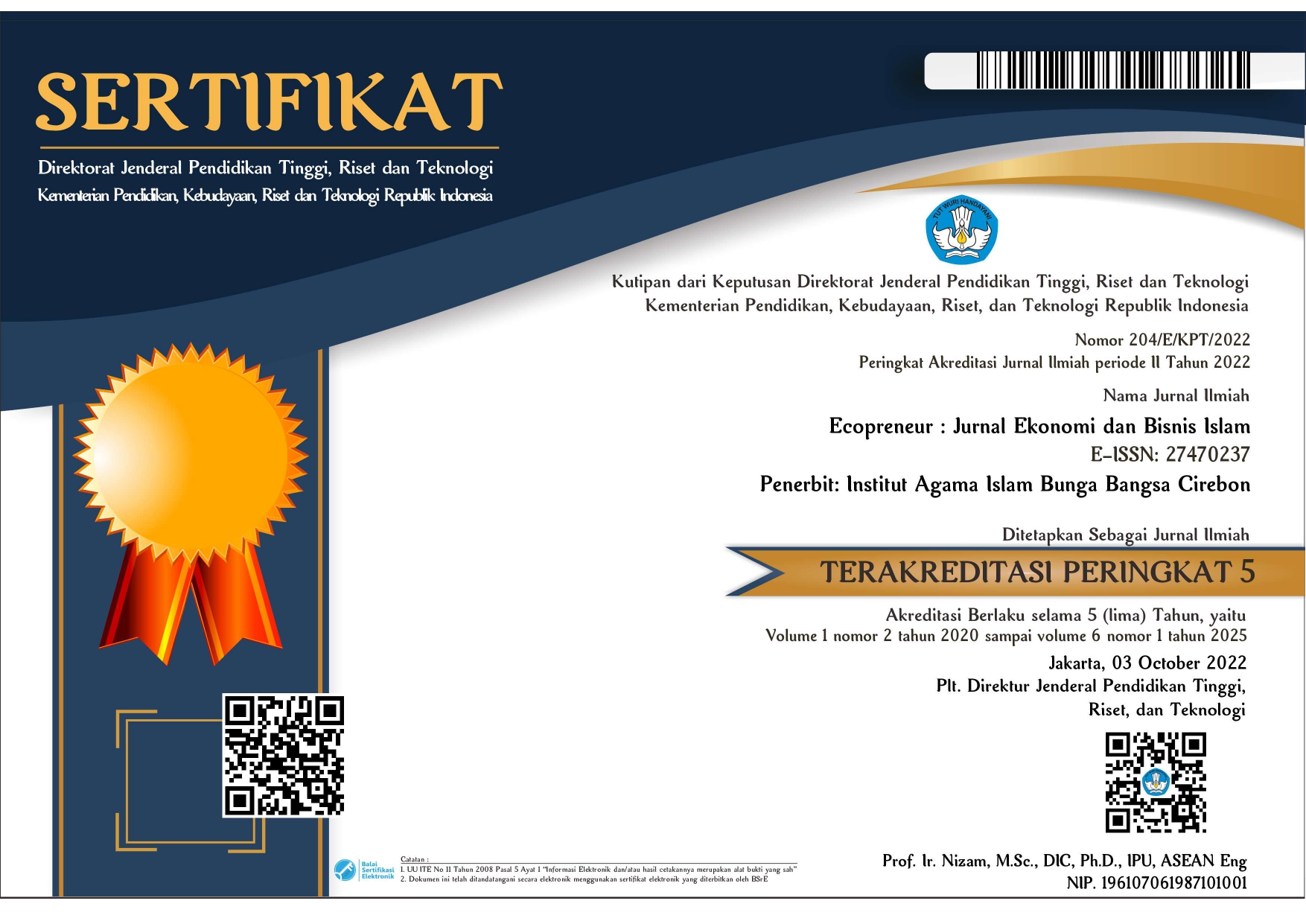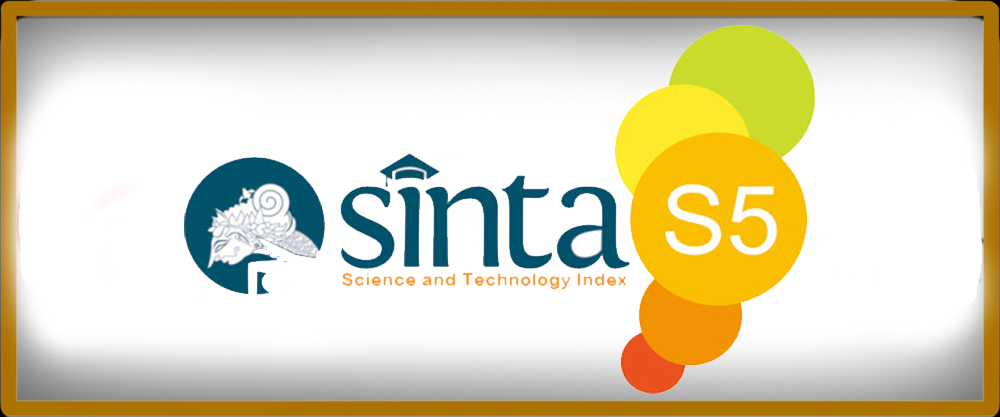Aksesibilitas Keuangan Mikro Syariah dengan Kewirausahaan melalui Pemberdayaan Perempuan Wirausaha Pedesaan
Abstract
Accessibility of financial services is access to financial services in a timely manner, and the adequacy of financing required by economically weaker, low-income groups at an affordable cost. The ability to face various risks with the initiative to create and do new things through the utilisation of resources with the aim of obtaining profits as a consequence. Women no longer only play the role of housewives but have been actively involved in various fields of life, whether social, economic or political. The discussion focuses on the accessibility of Islamic microfinance with entrepreneurship through empowering women as household managers and economic activity capabilities. The research method used in this research is descriptive qualitative research method and data validity is based on triangulation technique. The existence of financing institutions that focus on empowering women microfinance, which has been difficult for entrepreneurs in villages to access capital needs. Through various business assistance activities carried out by sharia-based microfinance institutions, it is very helpful for the growth and development of women microbusiness entrepreneurs through women's empowerment, because the presence of sharia-based microfinance institutions supported by strong capital from the government is very helpful in efforts to achieve the special benefits of empowering women as drivers of economic independence by becoming self-employed women.
Keywords: Islamic Microfinance Accessibility, Entrepreneurship, Women's Empowerment
Abstrak
Aksesibilitas jasa keuangan merupakan akses pada jasa keuangan secara tepat waktu, dan kecukupan pembiayaan yang diperlukan oleh kelompok yang lebih lemah secara ekonomi, berpendapatan rendah dengan biaya yang terjangkau. Kemampuan menghadapi berbagai risiko dengan inisiatif menciptakan dan melakukan hal-hal baru melalui pemanfaatan sumber daya dengan tujuan memperoleh keuntungan sebagai konsekuensinya. Perempuan tidak lagi hanya berperan sebagai ibu rumah tangga tetapi sudah aktif berperan di berbagai bidang kehidupan, baik sosial, ekonomi maupun politik. Pembahasan fokus pada aksesibilitas keuangan mikro syariah dengan kewirausahaan melalui pemberdayaan perempuan sebagai penata kelola rumah tangga dan kemampuan aktifitas ekonomi. Metode penelitian yang digunakan dalam riset ini adalah metode penelitian kualitatif deskriptif dan validitas data dilakukan berdasarkan teknik triangulasi. Keberadaan lembaga pembiayaan yang fokus pada pemberdayaan perempuan melalui pembiayaan mikro sangat berperan meningkatkan tingkat aksesibilitas keuangan mikro syariah yang selama ini wirausaha di desa-desa sulit untuk dapat mengakses kebutuhan permodalan. Melalui berbagai kegiatan usaha pendampingan yang dilakukan lembaga pembiayaan mikro yang berbasis syariah sangat membantu tumbuh kembangnya perempuan wirausaha usaha mikro melalui pemberdayaan perempuan, karena kehadiran lembaga pembiayaan mikro berbasis syariah yang didukung permodalan yang kuat dari pemerintah sangat membantu dalam upaya mencapai kemaslahatan khusus pemberdayaan perempuan sebagai penggerak kemandirian ekonomi dengan menjadi perempuan wirausaha mendiri.
Kata Kunci: Aksesibilitas Keuangan Mikro Syariah, Kewirausahaan, Pemberdayaan Perempuan
Downloads
References
Khozin, A. A., Pratama, F. A., Ridwan, M., Amin, N. M. F., & Lesmana, T. (2022). Inflation and the Stability of Islamic Finance. ICOBBA_2021, 404-409.
Marleni, E., Mustoip, S., & Sulkhah, S. (2024). Implementation of the Literacy Movement in Shaping Student Character in Elementary School. EduBase: Journal of Basic Education, 5(2), 120-130.
Munajim, A., Pratama, F. A., Ridwan, M., & Rohimah, I. (2022). The Operations of the Bank Wakaf Micro Indonesia with the Scheme for the Economic Empowerment of the People. ICOBBA_2021, 1-6.
Nasir, A., Busthomi, A. O., & Rismaya, E. (2022). Shariah Tourism Based on Local Wisdom: Religious, Income, Motivation, Demand and Value of Willingness to Pay (WTP). International Journal Of Social Science And Human Research, 5(08), 3811-3816.
Pratama, F. A., Ridwan, M., Yulianti, N., Ratnawati, R., Maulana, A., & Masitoh, S. I. (2022). Implementasi Persamaan Fungsi Non Linier Dalam Matematika Bisnis Pada Kehidupan Sehari-Hari. Change Think Journal, 1(03), 289-299.
Pratama, G. (2022). Comparative Study of The Empowerment of Zakat BAZNAS Indonesia and PPZ Malaysia. ICOBBA_2021, 212-216.
Putri, Y. D. S., Mustoip, S., Nisa, D. H., & Ramadhani, N. U. (2024). Implementation of Audiolingual Methods in Understanding Arabic Color Concepts in Class I SDIT Alif Mardiyah. JPS: Journal of Primary School, 1(2), 1-6.
Ridwan, M., Motik, D. P., & Nurwahid, H. I. (2022). Afzalur Rahman's Thinking Concept: Relevance with Worker Ethics According to Global Standards. ICOBBA_2021, 322-329.
Selasi, D., Agustiani, L. R., & Vidiati, C. (2022). Upaya Mengubah Pendapatan Usaha Mikro Kecil Menengah (UMKM) Melalui Digital Marketing. Jurnal Multidisiplin Madani, 2(3), 1247-1258.
Selasi, D., Munajim, A., & Komala, S. I. (2022). The Digitization of Islamic Philanthrophy In the Islamic Capital Market in Indonesia. ICOBBA_2021, 166-174.
Selasi, D., Munajim, A., & Komala, S. I. (2022). The Digitization of Islamic Philanthrophy In the Islamic Capital Market in Indonesia. ICOBBA_2021, 166-174.
Selasi, D., Muzayyanah, M., Tatmimah, I., Sari, F., & Indriyani, R. (2022). Contribution of Islamic Capital Market to National Capital Market. INCOME: Innovation of Economics and Management, 2(1), 1-7.
Selasi, D., Vidiati, C., & Munajim, A. (2022). Pertumbuhan Bank Syariah di ASEAN: Dalam Sejarah The Growth of Islamic Banks in ASEAN: In History. Ecobankers: Journal of Economy and Banking, 3(2), 157-171.
Selasi, D., Vidiati, C., & Munajim, A. (2022). Pertumbuhan Bank Syariah di ASEAN: Dalam Sejarah The Growth of Islamic Banks in ASEAN: In History. Ecobankers: Journal of Economy and Banking, 3(2), 157-171.
Selasi, D., Vidiati, C., & Sumarno, S. (2022). Pasar Menabung Saham Pada Pasar Modal Indonesia. Ecopreneur: Jurnal Ekonomi dan Bisnis Islam, 3(1), 68-77.
Selasi, D., Vidiati, C., & Tardjono, T. (2022). Sharia Capital Market: Securities Fatwa, Derivative Securities and Mechanisms. IJOBBA: International Journal of Bunga Bangsa Cirebon, 1(1), 1-24.
Selasi, D., Virdiati, C., Munajim, A., & Sujata, T. (2022). Kesejahteraan Masyarakat: Analisa Kualitatif Sistem Keuangan Komersial Islam-SIstem Keuangan Sosial Islam di Indonesia.
Stefanus, S., & Ridwan, M. (2022). Analisis Strategi Marketing Syariah Untuk Meningkatkan Omset Penjualan Pada Era Globalisasi Di Toko Emas Pantes Sindang Laut Kabupaten Cirebon. Change Think Journal, 1(01), 87-95.
Vidiati, C., Al-Ghozali, M. I., Faturrizky, I., Selasi, D., Munajim, A., & Tardjono, T. (2022). Effects of the Money Market and the Need for Knowledge of Interest Rates and the Foreign Exchange Market for Benefit: Evidence In Indonesia. IJOBBA: International Journal of Bunga Bangsa Cirebon, 1(1), 37-60.
Vidiati, C., Hendra, E., Selasi, D., & Sumarno, S. (2022). Menilik Tas’ ir Keadilan dan Maslahah. Ecopreneur: Jurnal Ekonomi dan Bisnis Islam, 3(1), 78-92.
Wartoyo, W., Haida, N., Mujab, S., & Umam, M. K. (2022). Sharia Marketing Model Pada Bisnis Laundry Syariah (Case Study Pada Zada Laundry Syariah Sumber Cirebon). PROFIT: Jurnal Kajian Ekonomi Dan Perbankan Syariah, 6(1).












